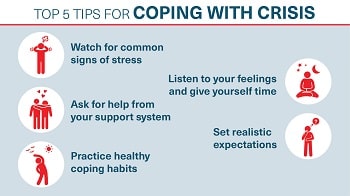In the midst of a crisis, it can be difficult to cope with feelings of fear, stress and anxiety. It's common to feel sad, overwhelmed, or anxious. Sometimes, we may feel unsure of what to do to cope. Over-exposure to the news and social media can increase stress levels, which can negatively impact mental health and overall wellbeing. Taking time for self-care is important, especially in the current global climate.
 Knowledge of Psychological First Aid has helped me shape my self-care plan. I drew inspiration from this Canadian Red Cross course by looking for signs of distress, listening to my emotions and body, and linking myself to the supports that I feel I need. I also learned how important it was to set up healthy boundaries and build my resilience.
Knowledge of Psychological First Aid has helped me shape my self-care plan. I drew inspiration from this Canadian Red Cross course by looking for signs of distress, listening to my emotions and body, and linking myself to the supports that I feel I need. I also learned how important it was to set up healthy boundaries and build my resilience.When times get tough, we must put our own oxygen mask on first. That means checking in with ourselves. There are several signs of stress to look for like increased anxiety, difficulty concentrating or pulling away from others. It’s important to listen to and acknowledge how we are feeling. We can ask ourselves: Am I tired even though I’ve had enough sleep? Am I anxious or easily irritated? Am I isolating myself?
We are our own support system. We can link anytime to what we need most for ourselves, whether that be reaching out to our support resources, relationships, or community to maintain balance.
What’s in your self-care toolbox?
No self-care plan would be complete without a toolbox of items that help us relax. Choose easy-to-access items that bring you comfort.
 Self-care looks different for each person. We all have our own unique experiences and self-care can encompass many things. For some, this may include favourite magazines, essential oils, hot tea, chocolate, or cuddling a beloved pet. Creative projects like knitting or writing can bring comfort, as well as DIY projects and other hobbies we enjoy.
Self-care looks different for each person. We all have our own unique experiences and self-care can encompass many things. For some, this may include favourite magazines, essential oils, hot tea, chocolate, or cuddling a beloved pet. Creative projects like knitting or writing can bring comfort, as well as DIY projects and other hobbies we enjoy.Other self-care coping activities can take the form of getting outdoors, spending time with loved ones, talking with a counsellor, focusing on better sleep and nutritious meals, watching a movie or playing a calming app. Consider limiting your exposure to news and social media to media to a couple of times a day. Switch off device notifications. Connect with someone to share how you’re feeling. What’s your self-care plan?
Reaching out for help
In some cases, we may need additional help to get us through difficult times. Pay attention to significant changes in your mood, sleep quality, substance use, and personal relationships, because these can be signs and symptoms of declining mental health.
Connect with your medical provider if you have any concerns about your mental or physical well-being, and remember that reaching out for help is a sign of strength and courage, and an important part of an effective self-care plan. Community-based mental health services and crisis support lines can also be valuable tools in helping us through difficult times.
The Canadian Red Cross has free resources on mental health and offers courses in Self-Care and Wellness, and Psychological First Aid. If you have been affected by a disaster or emergency, or are concerned about one happening, you may feel increased distress. Learn how you can prepare to take care of yourself and others when you are facing a disaster or emergency.
Related stories:

